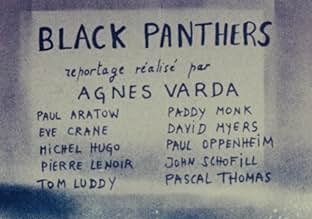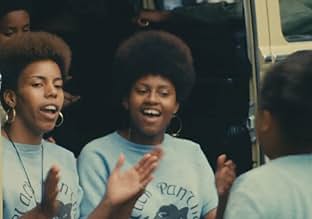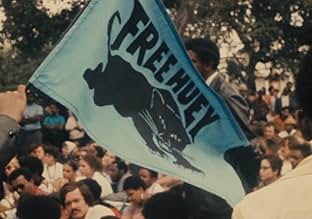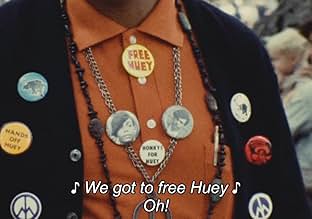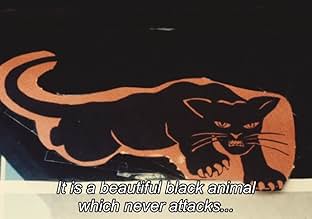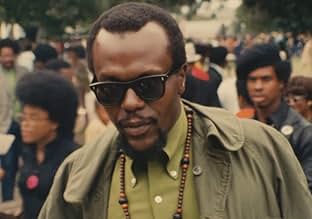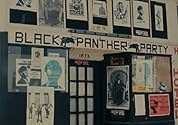IMDb रेटिंग
7.4/10
2.9 हज़ार
आपकी रेटिंग
अपनी भाषा में प्लॉट जोड़ेंA short film of interviews and protests at a rally to free Huey P. Newton.A short film of interviews and protests at a rally to free Huey P. Newton.A short film of interviews and protests at a rally to free Huey P. Newton.
H. Rap Brown
- Self
- (बिना क्रेडिट के)
Ron Dellums
- Self
- (बिना क्रेडिट के)
James Forman
- Self
- (बिना क्रेडिट के)
Bobby Seale
- Self
- (बिना क्रेडिट के)
फ़ीचर्ड समीक्षाएं
Bless Agnès Varda for making this short documentary, and for the most part simply allowing members of the Black Panthers to state their views and explain the motivation behind the Black Power movement. The issues are the same as those faced today by the community, and it certainly resonates to hear them speak of stopping the police from killing black people, or of incarceration as being stilted against minorities. The film was made around the time of the Huey Newton trial, and after governor Ronald Reagan had hypocritically overturned California's open carry law once black people started taking advantage of it. Mostly it consists of footage of people at rallies to "Free Huey!," interviews with leaders like Newton and Stokely Carmichael, and comments from supporters. It also includes great commentary from Kathleen Cleaver explaining the significance of black women wearing their hair naturally, in afros.
The film is a snapshot in time during the summer of 1968 which made it fascinating to me, but I wish it had been longer and more fleshed out. It probably should have also asked a critical question or two about the movement looking to Mao Zedong as a role model, given the brutality of his regime and the millions he killed. On the other hand, millions of black people had (and have) died in the system they were in with its widespread racism, so one can understand searching for an alternative, and becoming as assertive as they did when progress didn't just gradually happen. I loved how Varda provided a few moments of gentle narration, explaining to audiences the reasons for what seemed like a dangerous and possibly violent movement. This is well worth a half hour, and something to reflect on over half a century later.
The film is a snapshot in time during the summer of 1968 which made it fascinating to me, but I wish it had been longer and more fleshed out. It probably should have also asked a critical question or two about the movement looking to Mao Zedong as a role model, given the brutality of his regime and the millions he killed. On the other hand, millions of black people had (and have) died in the system they were in with its widespread racism, so one can understand searching for an alternative, and becoming as assertive as they did when progress didn't just gradually happen. I loved how Varda provided a few moments of gentle narration, explaining to audiences the reasons for what seemed like a dangerous and possibly violent movement. This is well worth a half hour, and something to reflect on over half a century later.
While Agnes Varda was in California shooting "Uncle Yanco", she made this short documentary about a rally to free Huey Newton after he had been jailed, as the documentary tells us, a shoot-out with the police that ended with ten people injured and one cop dead.
Mme. Varda shoots and edits this as an anthropological study, with only Back people speaking; indeed, you have to look carefully to spot a Caucasian in the background. Having grown up in this era, I note that it's a useful corrective to the usual coverage of events like this, in which one heard White people talking about the racial divide and how to deal with it.
Mme. Varda shoots and edits this as an anthropological study, with only Back people speaking; indeed, you have to look carefully to spot a Caucasian in the background. Having grown up in this era, I note that it's a useful corrective to the usual coverage of events like this, in which one heard White people talking about the racial divide and how to deal with it.
For any younger person such as myself who wasn't alive during the 60's and it's numerous radical movements, "Black Panthers" is a good historical piece of film. Vardas is definitely not objective here and is clearly rooting for the Black Panthers, but I can't really blame her when the opposition is the FBI and Oakland police.
Behind all the dry summaries and articles about the Black Panthers is a truly revolutionary spirit of an oppressed people. This film does a wonderful job capturing that spirit during one of the more important times for the Black Panthers, which was the trial of Huey Newton. I especially appreciated the extended interview of Huey Newton himself while he was in jail, footage of the underappreciated Stokely Carmicheal who was one of the more intellectual figures, and the focus on woman in the Black Panther party.
I wish there was more of a focus on differing parties in the movie, like the cops or white reactionaries. Not so the film could claim to be objective but because the claims of the Black Panthers (racism, fascism,etc.) could be shown as context for their rallies. In addition, there isn't much actual filmmaking shown here, just that a team was present. I would suggest the amazing "Harlan County" for a documentary that shows the spirit and soul of the movement, not just by showing up, but through filmmaking skills.
Overall it's a good visualizer of an interesting and important part of radical history in the U.S.
Behind all the dry summaries and articles about the Black Panthers is a truly revolutionary spirit of an oppressed people. This film does a wonderful job capturing that spirit during one of the more important times for the Black Panthers, which was the trial of Huey Newton. I especially appreciated the extended interview of Huey Newton himself while he was in jail, footage of the underappreciated Stokely Carmicheal who was one of the more intellectual figures, and the focus on woman in the Black Panther party.
I wish there was more of a focus on differing parties in the movie, like the cops or white reactionaries. Not so the film could claim to be objective but because the claims of the Black Panthers (racism, fascism,etc.) could be shown as context for their rallies. In addition, there isn't much actual filmmaking shown here, just that a team was present. I would suggest the amazing "Harlan County" for a documentary that shows the spirit and soul of the movement, not just by showing up, but through filmmaking skills.
Overall it's a good visualizer of an interesting and important part of radical history in the U.S.
Black Panthers (original title) is listed by IMDb with the title "Huey" (1968). However, we saw it with the original title. This half-hour documentary was directed by the French filmmaker Agnès Varda.
Varda went to a Black Panther rally in Oakland. The Panthers were demanding that the government free Huey Newton, co-founder of the Black Panther party. Newton was on trial, accused of murdering a police officer.
Beside filming the rally itself, Varda filmed an interview with Newton himself while he was in jail, In addition, she interviewed or recorded H. Rap Brown, Stokely Carmichael, Bobby Seale, and Eldridge Cleaver.
The Black Panthers Party was a revolutionary party, and they made no secret of the necessity to use violence to obtain their goals. They considered themselves at war with the Oakland Police Department. (Probably, the feeling was mutual.)
This is a historically important movie, especially for those who aren't old enough to remember the events of the late 1960's. It's also a lesson in the craft of documentary filmmaking, as exemplified by Agnès Varda. I would sum it up as "speak softly, but get the footage you need."
We saw this film at the wonderful Dryden Theatre in the George Eastman Museum in Rochester, NY. It's part of a Varda retrospective, co-sponsored by Rochester Institute of Technology and the Eastman Museum. I'm sure it will work well on the small screen.
P.S. Newton was eventually convicted of manslaughter, but a higher court overturned the verdict. He had two more trials, both of which ended in hung juries. Ultimately, the government gave up.
Varda went to a Black Panther rally in Oakland. The Panthers were demanding that the government free Huey Newton, co-founder of the Black Panther party. Newton was on trial, accused of murdering a police officer.
Beside filming the rally itself, Varda filmed an interview with Newton himself while he was in jail, In addition, she interviewed or recorded H. Rap Brown, Stokely Carmichael, Bobby Seale, and Eldridge Cleaver.
The Black Panthers Party was a revolutionary party, and they made no secret of the necessity to use violence to obtain their goals. They considered themselves at war with the Oakland Police Department. (Probably, the feeling was mutual.)
This is a historically important movie, especially for those who aren't old enough to remember the events of the late 1960's. It's also a lesson in the craft of documentary filmmaking, as exemplified by Agnès Varda. I would sum it up as "speak softly, but get the footage you need."
We saw this film at the wonderful Dryden Theatre in the George Eastman Museum in Rochester, NY. It's part of a Varda retrospective, co-sponsored by Rochester Institute of Technology and the Eastman Museum. I'm sure it will work well on the small screen.
P.S. Newton was eventually convicted of manslaughter, but a higher court overturned the verdict. He had two more trials, both of which ended in hung juries. Ultimately, the government gave up.
I've been deeply impressed by earlier work by Varda; when this happens with me the filmmaker's whole journey becomes a lifelong project. I have several of these running, open-ended affairs with creative, alert souls who I know I can always turn to for a far- reaching view.
This is a small snapshot, but no less part of the journey. It's among a few political films she did at the same time as Godard and others, with Vietnam booming in the distance.
It's a look at a rally party of the Black Panthers at the time of Huey Newton's trial for the murder of a policeman, but there's nothing more they can offer Varda's camera than sloganeering and Varda had no more time to devote into it, perhaps not the inclination to probe more and inquire. Possibly she was interested in no more than this glimpse in passing.
It says something that she was there of course, yet she also makes it a point to ask some of the rapt faces if they know Huey didn't do it; they don't, but they're fervent just the same, it's all part of a war being waged on them, Huey is a prisoner of that war, he must go free, or else.
There's a much more sobering history prior to and as we move away from that day, based on what little I know; the obsession with territory and tribal law, and on the other hand police abuse and a youthful life without prospects that would turn Southcentral LA into Beirut, but you have to remind yourself that this is all simmering behind the ideology and parades, the image barely able to contain a life that would soon spill from it.
Politics are thin, but maybe it is all here anyway for you to deepen? Politics aside, the glimpse is worthwhile. It's a day in that life, that place, that furor about injustice.
This is a small snapshot, but no less part of the journey. It's among a few political films she did at the same time as Godard and others, with Vietnam booming in the distance.
It's a look at a rally party of the Black Panthers at the time of Huey Newton's trial for the murder of a policeman, but there's nothing more they can offer Varda's camera than sloganeering and Varda had no more time to devote into it, perhaps not the inclination to probe more and inquire. Possibly she was interested in no more than this glimpse in passing.
It says something that she was there of course, yet she also makes it a point to ask some of the rapt faces if they know Huey didn't do it; they don't, but they're fervent just the same, it's all part of a war being waged on them, Huey is a prisoner of that war, he must go free, or else.
There's a much more sobering history prior to and as we move away from that day, based on what little I know; the obsession with territory and tribal law, and on the other hand police abuse and a youthful life without prospects that would turn Southcentral LA into Beirut, but you have to remind yourself that this is all simmering behind the ideology and parades, the image barely able to contain a life that would soon spill from it.
Politics are thin, but maybe it is all here anyway for you to deepen? Politics aside, the glimpse is worthwhile. It's a day in that life, that place, that furor about injustice.
क्या आपको पता है
- ट्रिवियाThis film is included in "Eclipse Series 43: Agnès Varda in California", released by Criterion.
- भाव
Narrator: The panther was chosen as their symbol. It is a beautiful black animal which never attacks, but, defends itself ferociously.
- कनेक्शनFeatured in Berkeley in the Sixties (1990)
टॉप पसंद
रेटिंग देने के लिए साइन-इन करें और वैयक्तिकृत सुझावों के लिए वॉचलिस्ट करें
विवरण
इस पेज में योगदान दें
किसी बदलाव का सुझाव दें या अनुपलब्ध कॉन्टेंट जोड़ें


